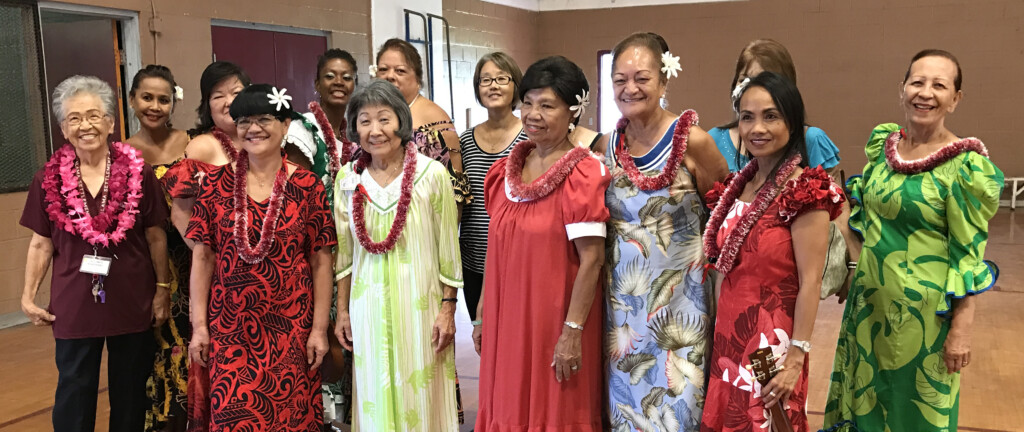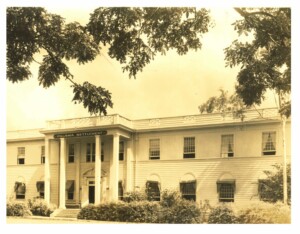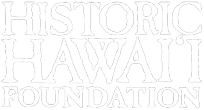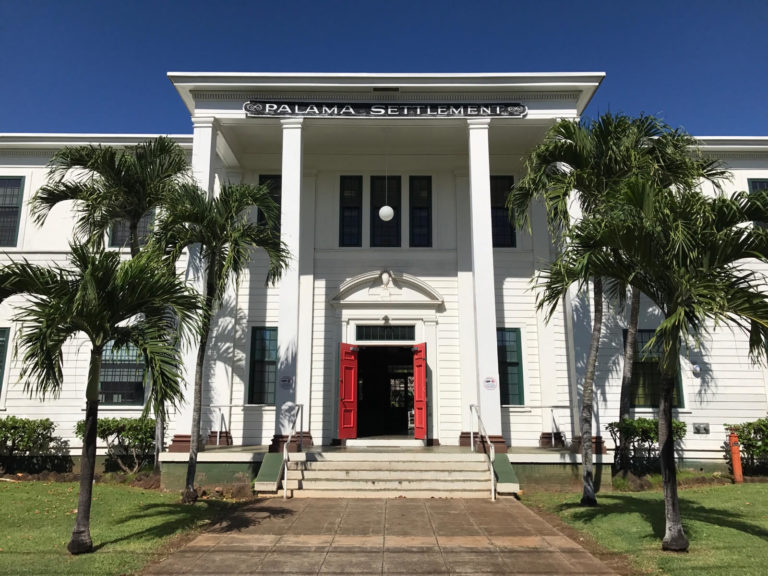Established in 1896, Palama Settlement is a non-profit, community-based social service agency serving the Kalihi and Pālama neighborhoods of O‘ahu. Founded by James and Ragna Rath, pioneers of social work in the Islands, the settlement was founded on the premise that social workers could better serve their constituents if they lived among them.
Journalist Paula Rath describes the traumatic circumstances her grandparents faced when they first arrived from Massachusets with the mission of transforming Palama chapel into a settlement.
“Pālama had been a quiet cluster of taro farms and cottages with vegetable gardens and little rice paddies until it experienced a sudden and radical change on Jan. 20, 1900. Five cases of bubonic plague had been reported in Chinatown, then a crowded, rat-infested business and residential area just east of Nu’uanu stream. The city tried to eradicate the disease by setting fire to the homes of plague victims. The fires got out of control, however, and burned down the entire, densely populated neighborhood.
The Chinatown fire altered the urban landscape and left thousands of residents and their families homeless. The city answered the need for homes by placing people in hastily-built tenements across the stream — in Pālama.
The landscape and lifestyles changed radically as people were crowded into a few ramshackle rooms.
There was inadequate water and sewers, and no open space for children to play. In a report to the community, Grandfather wrote, “Pālama is sadly in need of cleaning. I have seen most of the cities of the United States, but I have seen nothing as bad as this anywhere.”
It was a neighborhood in need: in need of healthcare, nutritious food, affordable housing, recreation, English classes and jobs.
Warren Nishimoto, director of the Center for Oral History at the University of Hawai’i-Manoa, has written about Palama Settlement in “The Hawaiian Journal of History.” He recently compared 1905 Honolulu to 2005 New Orleans: “When you think of the thousands of people who are displaced from the tragedy of Katrina, it makes me think of what happened in Honolulu when all those people were displaced after the Chinatown fire. Palama Settlement gave them some hope,” he said.
Within just a few years, the energetic couple had established an extensive public nursing program, low-cost rental cottages, youth athletic programs, day nurseries and day camps for children, a pure-milk depot and a night school in English, history, civics and geography.”
Due to the determination of the hard-working Raths, Palama Settlement today continues to offer a wide range of educational, recreational, athletic, cultural, social, health, and community building programs and services for all ages aiming to “partner with those who have the greatest needs in the community, empowering them to enhance their well-being through education, health and recreation.”

Palama’s aquatics program provides swimming instruction to people of all ages.

This group of women enjoy learning hula among friends at the settlement.
 During the COVID-19 pandemic, Palama Settlement has conducted food drives and provides an emergency food pantry by appointment offered to anyone who has suffered job loss, reduction of hours, or simply needs help making ends meet. This service is supported by donations of food and funding from the community.
During the COVID-19 pandemic, Palama Settlement has conducted food drives and provides an emergency food pantry by appointment offered to anyone who has suffered job loss, reduction of hours, or simply needs help making ends meet. This service is supported by donations of food and funding from the community.
AI FAMILY FUNDS ARCHIVAL PROJECT
Earlier this month, City Mill’s David C. Ai Charitable Trust presented the historic Palama Settlement with a generous donation to assist with a large-scale preservation and digitization project of photos, historic newspaper articles, annual reports, neighborhood surveys, oral histories and so much more.
“When we first opened the archives, Steven Ai was among the first to visit and was impressed with all the photos and documents that had been preserved for more than 100 years,” said Paula Rath, trustee emeritus for the Palama Settlement Board of Trustees. “Since City Mill has experienced three fires during their storied history, he expressed concern for the welfare of the archives and the importance of digitizing our thousands of photos and documents. At that moment, he promised that the David C. Ai Charitable Trust would help enable our digitization.”
 “We are pleased to support this wonderful project which will help preserve the extraordinary collection of history and memories in the Kalihi-Palama area,” said Steven Ai, president and CEO of City Mill. “From its start 125 years ago, Palama Settlement has chronicled the people, culture and events that has exemplified the spirit and community of this area. This project will ensure that its photo and document collections will now be preserved digitally for current and future generations to see.”
“We are pleased to support this wonderful project which will help preserve the extraordinary collection of history and memories in the Kalihi-Palama area,” said Steven Ai, president and CEO of City Mill. “From its start 125 years ago, Palama Settlement has chronicled the people, culture and events that has exemplified the spirit and community of this area. This project will ensure that its photo and document collections will now be preserved digitally for current and future generations to see.”
“My late mother, Jacky Rath, a retired librarian, spent more than ten years converting random boxes of photos, newspaper articles, and historical documents into an organized Finding Aid,” said Rath. “This made our cataloging and digitization possible. She would be amazed at the current digitization process, as she created the Finding Aid entirely in pencil, without the aid of a computer.”
With the generous donation, Palama Settlement was recently able to properly outfit the Palama Archives and begin the process of digitization.
How wonderful to see one family’s legacy support the legacy of another.


